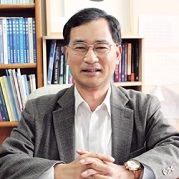| HONG Ki Joon 홍기준 | |
|---|---|

|
Professor
경희대학교 평화복지대학원 Graduate Institute of Peace Studies, Kyung Hee University 교수
홍기준 교수는 경희대학교 평화복지대학원 국제평화거버넌스 학과 학과장으로 재직중이며 경희대학교 평화복지대학원 동북아학과 석사 (1990), 벨기에 Leuven 대학교에서 유럽학 석사 (1991)와 국제관계학 박사 (1996)를 취득했다. 대통령자문 동북아시대위원회 평화분과 전문위원 (2004-2005)을 역임했으며 현재 한국유럽학회 회장 (2019)을 역임하고 있다. 홍기준 교수는 동북아와 유럽의 지역협력과 다자안보협력 분야에서 많은 연구업적을 보유하고 있다. 대표적인 저서와 논문으로는 The CSCE Security Regime formation: An Asian Perspective (Macmillan, 1997), “Path Emergence on the Korean Peninsula: From Division to Unification,” Pacific Focus, Vol. 27, No. 1, 2012, “The Six-Party Talks in the Post-Kim Jong-il Era: An Emergent Path toward a Northeast Asian Security Mechanism,” North Korean Review, Vol. 8, No. 2, 2012, “The Unintended Consequences of the Helsinki Final Act: A Path Emergence Theory Perspective,” International Political Science Review, Vol. 34, No. 3, 2013, “Institutional Multilateralism in Northeast Asia: A Path Emergence Theory Perspective,” Asian Studies Review, Vol. 11, No. 1, 2015. “Dynamics of Network Resonance: The Case of the Transnational Helsinki Network,” Europe-Asia Studies, Vol. 71, No. 2, 2019 등이 있다.
Ki-Joon Hong is a professor at the Graduate Institute of Peace Studies (GIP), Kyung Hee University, Seoul, Korea. He studied at the University of Leuven in Belgium for his MA and Ph.D from 1990 to 1996. He currently serves as President of the Korean Society of the Contemporary European Studies. His major publications include The CSCE Security Regime formation: An Asian Perspective (Macmillan, 1997), “Path Emergence on the Korean Peninsula: From Division to Unification,” Pacific Focus, Vol. 27, No. 1, 2012, “The Six-Party Talks in the Post-Kim Jong-il Era: An Emergent Path toward a Northeast Asian Security Mechanism,” North Korean Review, Vol. 8, No. 2, 2012, “The Unintended Consequences of the Helsinki Final Act: A Path Emergence Theory Perspective,” International Political Science Review, Vol. 34, No. 3, 2013, “Institutional Multilateralism in Northeast Asia: A Path Emergence Theory Perspective,” Asian Studies Review, Vol. 11, No. 1, 2015. “Dynamics of Network Resonance: The Case of the Transnational Helsinki Network,” Europe-Asia Studies, Vol. 71, No. 2, 2019. |
